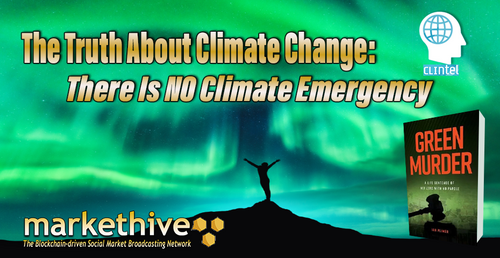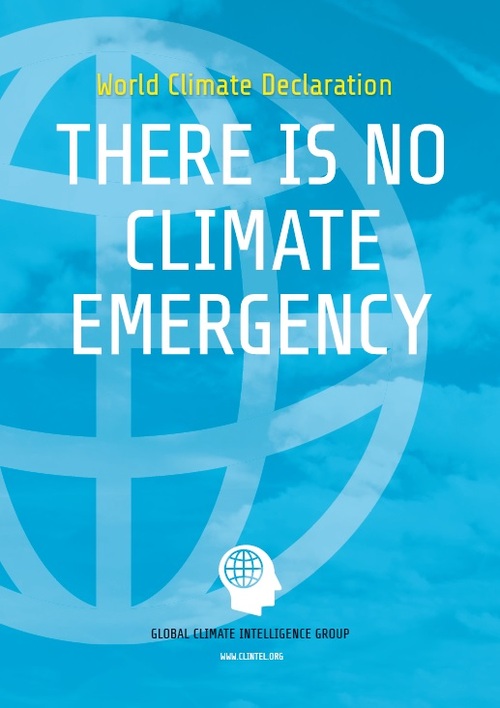The Truth About Climate Change:
There Is NO Climate Emergency

Large frameworks of science that don’t fit the narrative on climate change or global warming have been ignored by the Intergovernmental Panel on Climate Change (IPCC), the Conference of the Parties (COP), and self-interested scientists paid by taxpayers. A formidable industry has been subsidized, creating intermittent, unreliable wind and solar electricity based on unsubstantiated science.
The same charlatans now want subsidized hydrogen, costly inefficient electric vehicles, subsidized mega-batteries, and other appallingly expensive tried and failed schemes that impoverish people, create unemployment, transfer wealth and enrich China. Many parts of the world like Germany, Texas, California, and the UK have already had a glimpse of the Net-Zero CO2 by 2050 policy with blackouts, astronomically high electricity costs, and hundreds of deaths.
The sentiments above are from Professor Ian Plimer, a geologist and author in earth science who edifies his thoughts in his latest book, “Green Murder.” He’s part of the global network Climate Intelligence (CLINTEL), an independent foundation that operates in the fields of climate change and climate policy. It consists of over 1100 scientists and professionals that want to get the message out that there is no climate emergency.
Furthermore, in 2019, the unelected, unaccountable, transnational World Economic Forum (WEF), which is also the main driver behind The Great Reset, gave 16-year-old student Greta Thunberg a public stage, rendering her a poster child for climate change. Greta’s comments such as “I want you to panic”… “Our house is on fire,” terrified millions of children and adults worldwide.
But in a testimony to the US Congress on April 21, 2021, Greta stated that there is “no science” behind her comment; it was just a metaphor. At no point has WEF or its media-mogul trustees apologized for foisting fear on world citizens.
“Crickets” From WEF
CLINTEL, the climate intelligence think tank based in The Netherlands, sent a letter to Borge Brende, President of the WEF, in January 2020, calling for engagement on the issue of the claimed “climate emergency,” writing:
“Despite heated political rhetoric, we urge all world leaders to accept the reality that there is no climate emergency. There is ample time to use scientific advances to continue improving our society. Meanwhile, we should go for adaptation; it works whatever the causes [of climate change] are.”
“We also invite you to organize with us a constructive, open meeting between world-class scientists on both sides of the climate debate. Such an event complies with the sound and ancient principle that all pertinent parties should be fully heard.”
There has been no response from the WEF to date. The WEF’s unwillingness to engage with CLINTEL in an open scientific debate on climate change suggests the WEF is not acting with “moral and intellectual integrity is at the heart of everything it does,” as it claims.
On Dec. 24, 2021, CLINTEL also issued a letter to the President of Switzerland, concerned about the ‘host state’ status that Switzerland had bestowed on the World Economic Forum in January 2015. The Paris Agreement was signed that year, and it appears that WEF has adopted the mission to push the Club of Rome’s Planetary Emergency agenda.
The WEF’s 2006 Global Risks report.pdf featured oil price shock and pandemic as two severe global risks. However, by the 2020 report, WEF had removed both from the list of risks and replaced them with climate change.
Now the world is experiencing a global oil price shock, an energy crisis, and is struggling to recover from a pandemic. Millions of people face energy poverty and famine due to skewed energy investment markets, much of it driven by WEF trustees like Mark Carney demonizing vital energy.
Good vs. Evil
According to CLINTEL, climate science should be less political, while climate policies should be more scientific. In particular, scientists should emphasize that their modeling output is not the result of magic: computer models are human-made. What comes out depends entirely on what theoreticians and programmers have put in: hypotheses, assumptions, relationships, parameterizations, stability constraints, etc. Unfortunately, in mainstream climate science, most of this input is undeclared.
To believe the outcome of a climate model is to believe what the model makers have put in. This is precisely the problem of today’s climate discussion to which climate models are central. Climate science has degenerated into a discussion based on beliefs, not on sound self-critical science. We should free ourselves from the naïve belief in immature climate models. In the future, climate research must give significantly more emphasis to empirical science.
Below is the World Climate Declaration (WCD) CLINTEL has published that fall on deaf ears as far as the bureaucrats are concerned. This declaration is based on scientific fact and must be disseminated worldwide so that people are aware and not deceived by evil rhetoric, trickery, alarmist literature, and the greedy agenda of the elite few.

There Is No Climate Emergency
A global network of over 1100 scientists and professionals has prepared this urgent message. Climate science should be less political, while climate policies should be more scientific. Scientists should openly address uncertainties and exaggerations in their predictions of global warming, while politicians should dispassionately count the real costs as well as the imagined benefits of their policy measures.
Natural as well as anthropogenic factors cause warming
The geological archive reveals that Earth’s climate has varied as long as the planet has existed, with natural cold and warm phases. The Little Ice Age ended as recently as 1850. Therefore, it is no surprise that we are now experiencing a period of warming.
Warming is far slower than predicted
The world has warmed significantly less than predicted by IPCC on the basis of modeled anthropogenic forcing. The gap between the real world and the modeled world tells us that we are far from understanding climate change.
Climate policy relies on inadequate models
Climate models have many shortcomings and are not remotely plausible as global policy tools. They blow up the effect of greenhouse gases such as CO2. In addition, they ignore the fact that enriching the atmosphere with CO2 is beneficial.
CO2 is plant food, the basis of all life on Earth
CO2 is not a pollutant. It is essential to all life on Earth. Photosynthesis is a blessing. More CO2 is beneficial for nature, greening the Earth: additional CO2 in the air has promoted growth in global plant biomass. It is also good for agriculture, increasing the yields of crops worldwide.
Global warming has not increased natural disasters
There is no statistical evidence that global warming is intensifying hurricanes, floods, droughts, and suchlike natural disasters or making them more frequent. However, there is ample evidence that CO2-mitigation measures are as damaging as they are costly.
Climate policy must respect scientific and economic realities
There is no climate emergency. Therefore, there is no cause for panic and alarm. We strongly oppose the harmful and unrealistic net-zero CO2 policy proposed for 2050. If better approaches emerge, and they certainly will, we have ample time to reflect and re-adapt. The aim of global policy should be “prosperity for all” by providing reliable and affordable energy at all times. In a prosperous society, men and women are well educated, birth rates are low, and people care about their environment.
Epilogue
The World Climate Declaration (WCD) has brought a large variety of competent scientists together from all over the world*. The considerable knowledge and experience of this group are indispensable in reaching a balanced, dispassionate, and competent view of climate change.
From now onward, the group is going to function as the “Global Climate Intelligence Group.” The CLINTEL Group will give solicited and unsolicited advice on climate change and energy transition to governments and companies worldwide.
* It is not the number of experts but the quality of arguments that counts.
World Climate Declaration plus all signatories in pdf
World Climate Declaration AMBASSADORS
NOBEL LAUREATE PROFESSOR IVAR GIAEVER NORWAY/USA
PROFESSOR GUUS BERKHOUT / THE NETHERLANDS
DR. CORNELIS LE PAIR / THE NETHERLANDS
PROFESSOR REYNALD DU BERGER / FRENCH-SPEAKING CANADA
BARRY BRILL / NEW ZEALAND
VIV FORBES / AUSTRALIA
PROFESSOR JEFFREY FOSS † / ENGLISH SPEAKING CANADA
JENS MORTON HANSEN / DENMARK
PROFESSOR LÁSZIÓ SZARKA / HUNGARY
PROFESSOR SEOK SOON PARK / SOUTH KOREA
PROFESSOR JAN-ERIK SOLHEIM / NORWAY
SOTIRIS KAMENOPOULOS / GREECE
FERDINAND MEEUS / DUTCH-SPEAKING BELGIUM
PROFESSOR RICHARD LINDZEN / USA
HENRI A. MASSON / FRENCH-SPEAKING BELGIUM
PROFESSOR INGEMAR NORDIN / SWEDEN
JIM O’BRIEN / REPUBLIC OF IRELAND
PROFESSOR IAN PLIMER / AUSTRALIA
DOUGLAS POLLOCK / CHILE
DR. BLANCA PARGA LANDA / SPAIN
PROFESSOR ALBERTO PRESTININZI / ITALY
PROFESSOR BENOÎT RITTAUD / FRANCE
DR. THIAGO MAIA / BRAZIL
PROFESSOR FRITZ VAHRENHOLT / GERMANY
THE VISCOUNT MONCKTON OF BRENCHLEY / UNITED KINGDOM
DUŠAN BIŽIÄ / CROATIA, BOSNIA AND HERZEGOVINA, SERBIA, AND MONTE NEGRO
Source and Research:
https://clintel.org/world-climate-declaration/
https://clintel.org/
https://friendsofscience.org/
(8).gif)

Also published @ BeforeIt’sNews.com


